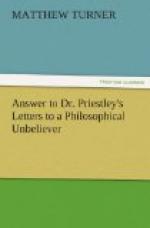12. “Although all things fall alike to all men and no distinction is made between the righteous and the wicked, and even though the wicked derive an advantage from their vices, yet this is consistent with a state of moral government by a Being of infinite wisdom and power.”
13. “As ploughing is the means of having a harvest, though God has predetermined whether there should be a harvest or not, so prayer is the means of obtaining good from God, although that good is predetermined upon; it is therefore no more absurd to pray than to plough.”
14. “Notwithstanding
happiness is the necessary consequence of
health, yet man’s happiness
is more from intellectual than corporeal
feelings.”
15. “Evil is necessarily
connected with and subservient to good,
although in the next world
there will be all good and no evil.”
16. “By reason we can discover the necessary existence of a Deity, yet to be a sceptic on that subject is the first step to be a Christian, because reason not sufficiently proving it we fly to revealed truth.”
17. “The power,
which a man has by the comprehensiveness of his mind
to enjoy the future, has no
apparent limits.”
18. “It is of no avail in the argument concerning the existence of a Deity, that we have no conception of him, since it does not imply impossibility of his existence that we have no idea at all upon the subject.”
INADMISSIBLE OR INCONCLUSIVE.
1. “The question of the existence of a Deity is important.”
2. “A Theist has
a higher sense of personal dignity than an
atheist.”
3. “The conduct
of an atheist must give concern to those who are not
so.”
4. “An atheist
believes himself to be, at his death, for ever
excluded from returning life.”
5. “There are more atheists than unbelievers in revelation.”
6. “Men of letters
may have the same bias to incredulity as others
to credulity, because they
are subject to a wrong association of
ideas, as well as other persons
though in a less degree.”
7. “Whoever first
made a thing, for example a chair or a table, must
have had an adequate idea
of it’s nature and use.”
8. “If a table had a designing cause, the tree from whence the wood came, and the man who made the table must have had a designing cause, which comprehended all the powers and properties of trees and men.”
9. “All the visible
universe, as far as we can judge, bears the
marks of being one work, and
therefore must have had a cause of
infinite power and intelligence.”
10. “We might as
well say a table had no cause, as that the world
had none.”
11. “A Being originally
and necessarily capable of comprehending
itself, it is not improper
to call infinite, for we can have no idea
of any bounds to it’s
knowledge or power.”




